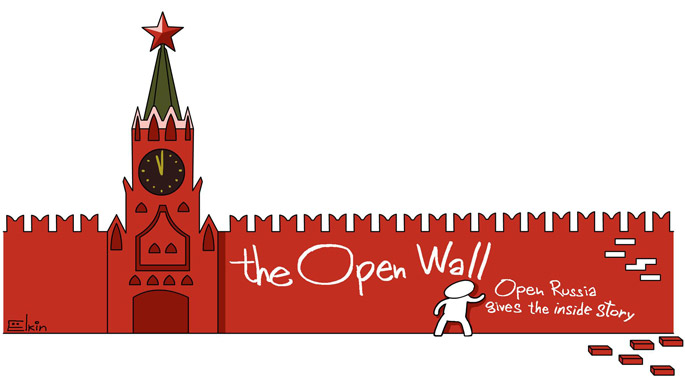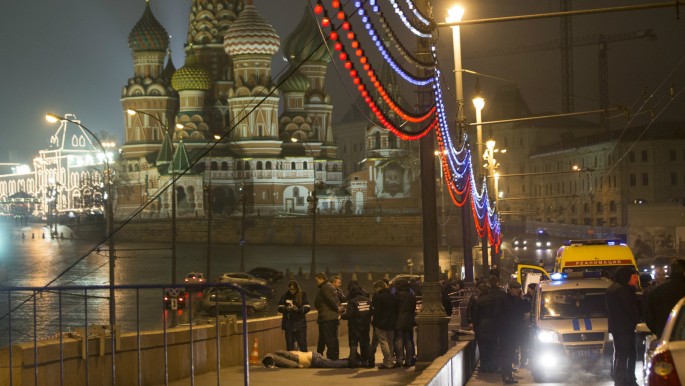“No person, no problem”

“No person, no problem”
On 3 October, Moscow saw the opening session of the trial into the murder of politician Boris Nemtsov, who was gunned down on Bolshoi Moskvoretsky Bridge, opposite the Kremlin, on 27 February 2015.

The start of the high-profile court case almost coincided with the tenth anniversary of the murder of Anna Politkovskaya, a journalist shot dead on 7 October 2006 in her apartment block. The two crimes are linked not only by method, but in terms of the reaction of the authorities, the investigation and the court.
“When we analysed what’s publicly known about the Boris Nemstov case, we were horrified by the similarities between the two murders. They’re almost carbon copies, it’s appalling,” Anna Politkovskaya’s son Ilya told reporters this year.
The common thumbprint of the two hits also caught the eye of Novaya Gazeta, where Politkovskaya worked as a journalist. Her colleagues have established more than 15 points of intersection between the two murders, from the number of shots to the Kremlin’s response: “Both Anna Politkovskaya and Boris Nemtsov were shot four times. It was a firing squad. In the aftermath, Putin infamously stated that Politkovskaya’s death caused more harm to Russia than her publications. As for Boris Nemtsov, the Kremlin expressed the sense that his murder posed no threat to the authorities, since he was “an ordinary citizen.”
Russian investigators are highly sensitive to signals from the Kremlin. So when Putin’s press secretary Dmitry Peskov described Nemtsov’s assassination as a provocation, the then spokesman of the Investigative Committee Vladimir Markin immediately suspected the involvement of “masterminds pulling the strings from abroad.”
What’s more, Putin’s phrase about Politkovskaya’s death causing more harm than her articles ever did, effectively became the guiding principle of the investigation. Petros Garibyan, the lead federal investigator, did not try to conceal his acquaintance with the suspected primary source or question the latter’s alibi: “Ramzan Kadyrov did not benefit at all from the death of Anna Politkovskaya. In the summer and autumn of 2006 he was preparing to become the president of Chechnya, and this high-profile murder did him more harm than good. So it would be logical to look for the sponsors among Kadyrov’s enemies, not his friends.”
Nevertheless, counsel for Anna Politkovskaya’s children insisted that Kadyrov be interrogated. And although the Chechen leader has yet to be hauled in for questioning, the victims’ lawyer, Karina Moskalenko, still believes that it must happen: “We cited publications in which [Kadyrov] said that he knew for certain who had killed Anna Politkovskaya. <…> We only want to ask him to explain what he meant by that statement.”
Counsel for the Nemtsov family also insisted that Kadyrov be questioned, and if the investigation were to comply with the request, other questions would surely follow. Zhanna, daughter of Boris Nemtsov, says the following: “I am convinced that Ramzan Kadyrov has valuable information for the investigation. <…> Some of the perpetrators are linked to the Chechen law enforcement bodies in one way or other, including Zaur Dadaev [who allegedly pulled the trigger – Ed.]. He was a member of the Sever battalion, which is stationed in Chechnya under the formal control of the Ministry of Internal Affairs, but everyone knows that, de facto, it is controlled by Ramzan Kadyrov. I don’t believe that anything can happen in Chechnya without his knowledge.”
A more diligent investigation in both cases would have uncovered far more eyewitness reports. For instance, Alfred Koch, former deputy prime minister and one of Nemtsov’s closest friends, believes that the murder may have been witnessed by intelligence agents assigned to follow the politician: “Boris knew that he was being spied on by Putin’s ‘pros.’ They didn’t even try to hide it. He even knew the faces of some of them. But no one bothered to find out who the other people tracking him were.”
When in 2014 the Moscow City Court sentenced by jury decision five defendants to long prison terms for the murder of Anna Politkovskaya (two were sentenced to life imprisonment), the prosecutor Maria Semenenko described the verdict as the “pinnacle of collaboration between the Investigative Committee and the Prosecutor’s Office.” Semenenko is now the prosecutor in the Nemtsov trial.
However, Karina Moskalenko, counsel for Anna Politkovskaya’s family, was less gushing: “The investigation was poorly conducted from start to finish.”
Similarly, the Investigative Committee recently hailed its inquiry into the Nemtsov murder as a success. The only problem is that Zhanna Nemtsova rejects the finding that her father’s murder was ordered by a lowly police driver called Ruslan Mukhutdinov: “The case will only be wrapped up when the perpetrators, organisers and masterminds are established and punished.”
To get a flavour of the investigative detail in the Nemtsov case, suffice it to say that the Federal Protective Service refused to provide investigators with CCTV footage of Bolshoi Moskvoretsky Bridge filmed from the side of the Kremlin. Neither did they justify their decision. The Investigative Committee did not demur. Instead, the protests have come from the Nemtsov family’s legal team, who argue that the decision to end the investigation was unlawful. But the court does not seem to be taking much notice.
Even if the order to eliminate Nemtsov and Politkovskaya did not come directly from the Kremlin, the impunity with which the assassinations were carried out effectively makes it an accomplice. Moreover, it is the regime that derives maximum benefit from such reprisals. Recall that Politkovskaya was so uncompromising and dangerous that the Russian special services could only disrupt her trip to Beslan (where the hostage-taking was unfolding) by allegedly poisoning her tea on board the plane. Had Nemtsov been alive today, the Russian opposition might have patched up its deep-rooted differences ahead of the Duma election.
Stalin had a phrase for this method of government, one that is still in common use today, and not only in the Kremlin – “No person, no problem.”



